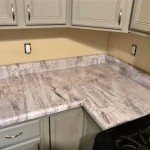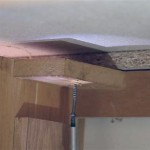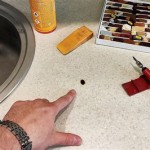What Do I Use To Clean Granite Countertops?
Granite countertops are a highly desirable feature in many kitchens and bathrooms, admired for their durability, beauty, and relatively low maintenance. However, improper cleaning techniques and the use of unsuitable cleaning products can damage the surface, leading to etching, discoloration, and loss of shine. Understanding the appropriate cleaning agents and methods is crucial for preserving the integrity and aesthetic appeal of granite countertops for years to come.
The primary concern in granite countertop cleaning is avoiding harsh chemicals, abrasive materials, and acidic substances that can react with the natural minerals within the stone. While granite is a hard and resilient material, it is still porous to some degree, allowing liquids to penetrate the surface and potentially cause staining or damage if not properly sealed and maintained. Therefore, a gentle and pH-neutral cleaning approach is generally recommended.
Daily cleaning and maintenance form the foundation of maintaining pristine granite countertops. Removing spills and messes promptly prevents stains from setting in and minimizes the likelihood of damage. A simple routine of wiping down the countertops after each use with appropriate materials is highly beneficial. Furthermore, understanding the specific properties of granite and the potential effects of different cleaning agents is essential for informed decision-making.
Essential Cleaning Supplies for Granite Countertops
The selection of proper cleaning supplies is paramount when caring for granite countertops. The following items are generally considered safe and effective for regular cleaning and maintenance:
Microfiber Cloths: These cloths are highly recommended due to their non-abrasive nature and ability to effectively lift dirt and grime without scratching the granite surface. Microfiber cloths are designed with tightly woven fibers that trap particles and prevent them from being dragged across the countertop. They are also reusable and washable, making them an environmentally friendly and cost-effective option. It is important to use clean microfiber cloths to avoid transferring dirt or debris back onto the countertop.
pH-Neutral Dish Soap: A mild dish soap with a neutral pH is a safe and effective cleaning agent for granite countertops. The pH level is a measure of acidity or alkalinity, with a neutral pH of 7 being ideal for granite. Avoid using dish soaps that contain lemon, vinegar, or other acidic additives, as these can etch or dull the surface over time. When using dish soap, dilute a small amount in warm water to create a gentle cleaning solution.
Warm Water: Often, warm water alone is sufficient for cleaning granite countertops. It is a gentle and effective way to remove surface dirt and grime without the risk of damaging the stone. When using warm water, be sure to wipe the countertop dry with a clean microfiber cloth to prevent water spots from forming.
Spray Bottle: A spray bottle is a useful tool for applying cleaning solutions evenly across the granite surface. Ensure the spray bottle is clean and free of any residue from previous cleaning products. Using a dedicated spray bottle specifically for granite cleaning helps to prevent contamination and ensures the integrity of the cleaning solution.
Granite Cleaner (Specifically Formulated): Numerous commercially available granite cleaners are specifically formulated to be safe and effective for granite countertops. These cleaners are typically pH-neutral and designed to clean, protect, and enhance the shine of granite surfaces. When choosing a granite cleaner, always read the label carefully and follow the manufacturer's instructions. It is also advisable to test the cleaner on an inconspicuous area of the countertop before applying it to the entire surface.
Avoiding abrasive scrub pads, harsh chemicals (such as bleach, ammonia, and acidic cleaners), and scouring powders is crucial to prevent damage to the granite surface. These materials can scratch, etch, or dull the finish of the countertop, diminishing its beauty and value. Always opt for gentle cleaning agents and non-abrasive materials to maintain the integrity of the granite.
Cleaning Methods for Granite Countertops
The cleaning method used on granite countertops is as important as the cleaning supplies themselves. Employing gentle and effective techniques ensures that the countertops are thoroughly cleaned without causing any damage. The following methods are recommended for routine cleaning and dealing with spills and stains:
Daily Cleaning: For daily cleaning, simply wipe down the granite countertops with a clean, damp microfiber cloth. This will remove surface dirt, crumbs, and spills before they have a chance to set in. For more thorough cleaning, lightly spray the countertop with a solution of warm water and a few drops of pH-neutral dish soap. Wipe the solution across the surface with a clean microfiber cloth, then rinse with a damp cloth to remove any soap residue. Finally, dry the countertop with another clean microfiber cloth to prevent water spots.
Addressing Spills: Promptly address spills as soon as they occur to prevent staining. Blot the spill with a clean cloth to absorb the liquid. Avoid rubbing the spill, as this can spread the stain and make it more difficult to remove. Once the liquid has been absorbed, clean the area with a solution of warm water and pH-neutral dish soap. Rinse and dry as described above. For stubborn spills, consider using a granite cleaner specifically formulated to remove stains.
Removing Stains: Removing stains from granite countertops can be challenging, but it is often possible with the right techniques and cleaning agents. The type of stain will determine the appropriate cleaning method. For oil-based stains (such as cooking oil or grease), apply a paste of baking soda and water to the stained area. Cover the paste with plastic wrap and let it sit for several hours or overnight. The baking soda will draw the oil out of the granite. Remove the plastic wrap and wipe away the paste with a damp cloth. Rinse and dry the countertop thoroughly.
For water-based stains (such as coffee, tea, or juice), try using a solution of hydrogen peroxide and water. Apply the solution to the stained area and let it sit for a few minutes. Wipe away the solution with a damp cloth. Rinse and dry the countertop thoroughly. For more stubborn stains, consider using a commercially available stain remover specifically designed for granite countertops. Always follow the manufacturer's instructions carefully.
Dealing with Hard Water Spots: Hard water spots can be a common problem, especially in areas with hard water. To remove hard water spots from granite countertops, try using a solution of equal parts white vinegar and water. Apply the solution to the affected area and let it sit for a few minutes. Wipe away the solution with a damp cloth. Rinse and dry the countertop thoroughly. Be cautious when using vinegar, as it is slightly acidic and can potentially etch the granite surface if used excessively or left on for too long. Always dilute the vinegar with water and rinse the countertop thoroughly after cleaning.
Preventative Measures: Preventing stains and damage is always the best approach. Use coasters under drinks to prevent water rings and spills from damaging the granite surface. Use cutting boards when preparing food to protect the countertop from scratches and stains. Avoid placing hot pots and pans directly on the granite, as this can cause thermal shock and potentially crack the stone. Sealing granite countertops regularly helps to protect them from staining and damage. The frequency of sealing will depend on the type of granite and the amount of use it receives. Follow the manufacturer's instructions for sealing granite countertops.
Maintenance and Protection of Granite Countertops
In addition to regular cleaning, proper maintenance and protection are essential for preserving the beauty and longevity of granite countertops. Sealing, polishing, and addressing repairs promptly are key aspects of a comprehensive maintenance plan.
Sealing Granite Countertops: Sealing granite countertops is a critical step in protecting them from staining and damage. Granite is a porous material, meaning that it has tiny pores that can absorb liquids. When liquids penetrate the surface of the granite, they can cause stains that are difficult or impossible to remove. Sealing the granite creates a protective barrier that prevents liquids from penetrating the surface. The frequency of sealing will depend on the type of granite and the amount of use it receives. As a general rule, granite countertops should be sealed at least once a year, or more often if they are heavily used. To test whether granite countertops need to be sealed, place a few drops of water on the surface. If the water beads up, the granite is properly sealed. If the water soaks into the granite within a few minutes, the granite needs to be sealed. Follow the manufacturer's instructions carefully when sealing granite countertops. Typically, the process involves cleaning the countertop thoroughly, applying the sealant evenly across the surface, and allowing it to dry for the recommended amount of time.
Polishing Granite Countertops: Polishing granite countertops can help to enhance their shine and luster. Over time, granite countertops can become dull and scratched due to normal wear and tear. Polishing the granite can help to restore its original beauty. There are several ways to polish granite countertops. One option is to use a commercially available granite polish. These polishes typically contain mild abrasives that help to remove surface scratches and restore the shine of the granite. Follow the manufacturer's instructions carefully when using a granite polish. Another option is to hire a professional stone restoration company to polish the granite countertops. Professional stone restoration companies have the expertise and equipment to polish granite countertops safely and effectively.
Addressing Repairs Promptly: Addressing any repairs to granite countertops promptly is essential to prevent further damage. Cracks, chips, and other damage can compromise the integrity of the countertop and make it more susceptible to staining and other problems. Small chips and cracks can often be repaired with a granite repair kit. These kits typically contain epoxy resin and color pigments that can be used to fill in the damaged area. Follow the manufacturer's instructions carefully when using a granite repair kit. For more extensive damage, it is best to hire a professional stone restoration company to repair the granite countertops. Professional stone restoration companies have the expertise and equipment to repair granite countertops safely and effectively. They can also match the color and texture of the repair to the existing granite, making the repair virtually invisible.
By using the appropriate cleaning supplies and methods, sealing the granite regularly, polishing it when necessary, and addressing any repairs promptly, homeowners can ensure that their granite countertops remain beautiful and functional for many years to come. Proper care and maintenance are the keys to preserving the value and aesthetic appeal of this desirable feature.

How To Clean Granite Countertops

How To Clean Granite Countertops

How To Clean Granite Countertops Properly Dude

How To Clean Granite Countertops With Steam

How To Clean Granite Countertops Plus Care Tips

How To Clean Your Granite Countertops So They Shine Like New Happy Coaching

How To Clean Every Kind Of Countertops Help Around The Kitchen Food Network

How To Clean Granite Countertops According An Expert

How To Properly Clean And Disinfect Your Kitchen Countertops

Tips And Tricks For Cleaning Sealing Your Granite Countertops Kitchens Baths By Grande Decor Design Remodel 610 543 1361








